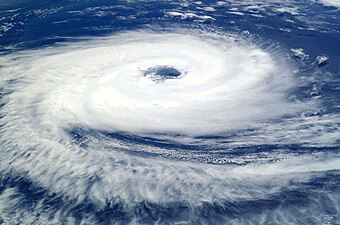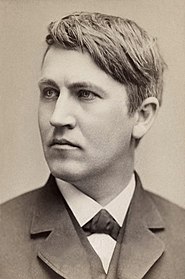| Main page | New articles & Tasks |
 The Energy Portal Welcome to Wikipedia's Energy portal, your gateway to energy. This portal is aimed at giving you access to all energy related topics in all of its forms.
|
Page contents: Selected article • Selected image • Selected biography • Did you know? • General images • Quotations • Related portals • Wikiprojects • Major topics • Categories • Help • Associated Wikimedia |
Introduction
Energy (from Ancient Greek ἐνέργεια (enérgeia) 'activity') is the quantitative property that is transferred to a body or to a physical system, recognizable in the performance of work and in the form of heat and light. Energy is a conserved quantity—the law of conservation of energy states that energy can be converted in form, but not created or destroyed. The unit of measurement for energy in the International System of Units (SI) is the joule (J).
Forms of energy include the kinetic energy of a moving object, the potential energy stored by an object (for instance due to its position in a field), the elastic energy stored in a solid object, chemical energy associated with chemical reactions, the radiant energy carried by electromagnetic radiation, the internal energy contained within a thermodynamic system, and rest energy associated with an object's rest mass. These are not mutually exclusive.
All living organisms constantly take in and release energy. The Earth's climate and ecosystems processes are driven primarily by radiant energy from the sun. The energy industry provides the energy required for human civilization to function, which it obtains from energy resources such as fossil fuels, nuclear fuel, and renewable energy. (Full article...)
Selected article

Coal supplies a quarter of Turkey's primary energy. The heavily subsidised coal industry generates over a third of the country's electricity and emits a third of Turkey's greenhouse gases.
Coal is a major contributor to air pollution, and damages health across the nation, being burnt even in homes and cities. It is estimated that a phase out of coal power in Turkey by 2030 instead of by the 2050s would save over 100 thousand lives. Flue gas emission limits are in place, but data from mandatory reporting is not made public. (Full article...)
Selected image

Photo credit: Johnson Space Center/NASA
Tropical cyclones feed on the heat released when moist air rises and the water vapor condenses.
Did you know?
- During World War I, the German Army produced shale oil from Yarmouk oil shale deposits in Jordan to operate the Hijazi Railway (pictured)?
- Dennis Spurgeon, formerly chief operating officer at uranium supplier USEC Inc., became the United States Assistant Secretary for Nuclear Energy in 2006?
- Japan Canada Oil Sands Limited was the first offshore oil company to exploit the Athabasca oil sands in Canada?
- Teesside Power Station is the largest combined-cycle gas turbine (CCGT) plant in Europe.?
- The Klaipėda Geothermal Demonstration Plant in Lithuania was the first geothermal plant in the Baltic Sea region?
- Hitachi Zosen Corporation built the first oil tanker in Japan in 1908 per an order by Standard Oil Company?
- Coalbed methane is a form of natural gas extracted from coal beds?
- When constructed in 1906, the Baku–Batumi pipeline was the world's longest kerosene pipeline?
Selected biography
Edison invented the first commercially practical electric light bulb which, by 1879 would burn for hundreds of hours. He was able to sell the concept to homes and businesses by mass-producing them and creating a complete system for the generation and distribution of electricity.
Edison patented an electric distribution system in 1880, and in January 1882 he switched on the first steam generating power station at Holborn Viaduct in London, UK. The direct current (DC) supply system provided electricity supplies to street lamps and a number of private dwellings within a short distance of the station. The first investor-owned electric utility, Pearl Street Station, New York City, started generating on September 4, 1882, providing 110 volts direct current to 59 customers in lower Manhattan.
Life magazine (USA), in a special double issue, placed Edison first in the list of the "100 Most Important People in the Last 1000 Years," noting that the light bulb he promoted "lit up the world." He was ranked thirty-fifth on Michael H. Hart's list of the most influential figures in history.
In the news
- 4 December 2024 – 2024 Cuba blackouts
- Another round of blackouts in Cuba leave millions of households without power. The energy ministry says that it is prioritizing restoring electricity to hospitals and water pumping facilities. (Reuters)
- 30 November 2024 – Ibar-Lepenac attack
- Police arrest eight people linked to an explosion on a canal near Zubin Potok, Mitrovica District, Kosovo, that supplies water to the country's two main power plants. The Kosovar government blames Serbia for the "terrorist" acts, which Serbia denies. (Al Jazeera) (Euronews) (Le Monde)
- 28 November 2024 – Russian invasion of Ukraine
- Russian strikes against Ukrainian infrastructure, Ukrainian energy crisis
- 22 November 2024 –
- Energy company Phillips 66 is indicted in a United States federal court on six charges of violating the Clean Water Act in Los Angeles County, California. (CBS News)
- 20 November 2024 –
- Indian billionaire and Adani Group chairman Gautam Adani is indicted in the U.S. for his role in an alleged multi-billion dollar bribery and fraud scheme where he and seven others paid Indian government officials US$265 million to obtain contracts for Adani Green Energy. (AsiaOne) (Bloomberg)
General images
Quotations
- "We simply must balance our demand for energy with our rapidly shrinking resources. By acting now we can control our future instead of letting the future control us." – Jimmy Carter, 1977
- "It is sensible to improve energy efficiency and to develop alternative and sustainable sources of supply; it's sensible to replant the forests which we consume; it's sensible to re-examine industrial processes; it's sensible to tackle the problem of waste. I understand that the latest vogue is to call them 'no regrets' policies. Certainly we should have none in putting them into effect." – Margaret Thatcher, 1990
- "We have the opportunity and potential to create an oil-free future today, it is potentially right around the corner - and, more often than not, the technology is already here." – John Kerry, 2003
Related portals
WikiProjects
WikiProjects connected with energy:
Other WikiProjects that may be of interest:
Major topics
Major categories
National energy supply, use & conservation
National electricity sector
Politics, economics, environment
- Climate change
- Energy conservation
- Energy economics
- Energy crises
- Energy development
- Energy policy
- Peak oil
Energy sources
- Fuels
- Biofuels
- Fossil fuels
- Fusion power
- Nuclear technology
- Renewable energy
- Energy conversion
- Electric power
- Energy storage
Energy-related design
Scientific usage
Help

Puzzled by energy?
Can't answer your question?
Don't understand the answer?
- Ask at the reference desk
- Read the Wikipedia help pages
For further ideas, to leave a comment, or to learn how you can help improve and update this portal, see the talk page.
Associated Wikimedia
The following Wikimedia Foundation sister projects provide more on this subject:
-
Commons
Free media repository -
Wikibooks
Free textbooks and manuals -
Wikidata
Free knowledge base -
Wikinews
Free-content news -
Wikiquote
Collection of quotations -
Wikisource
Free-content library -
Wikiversity
Free learning tools -
Wiktionary
Dictionary and thesaurus
























































































































































































